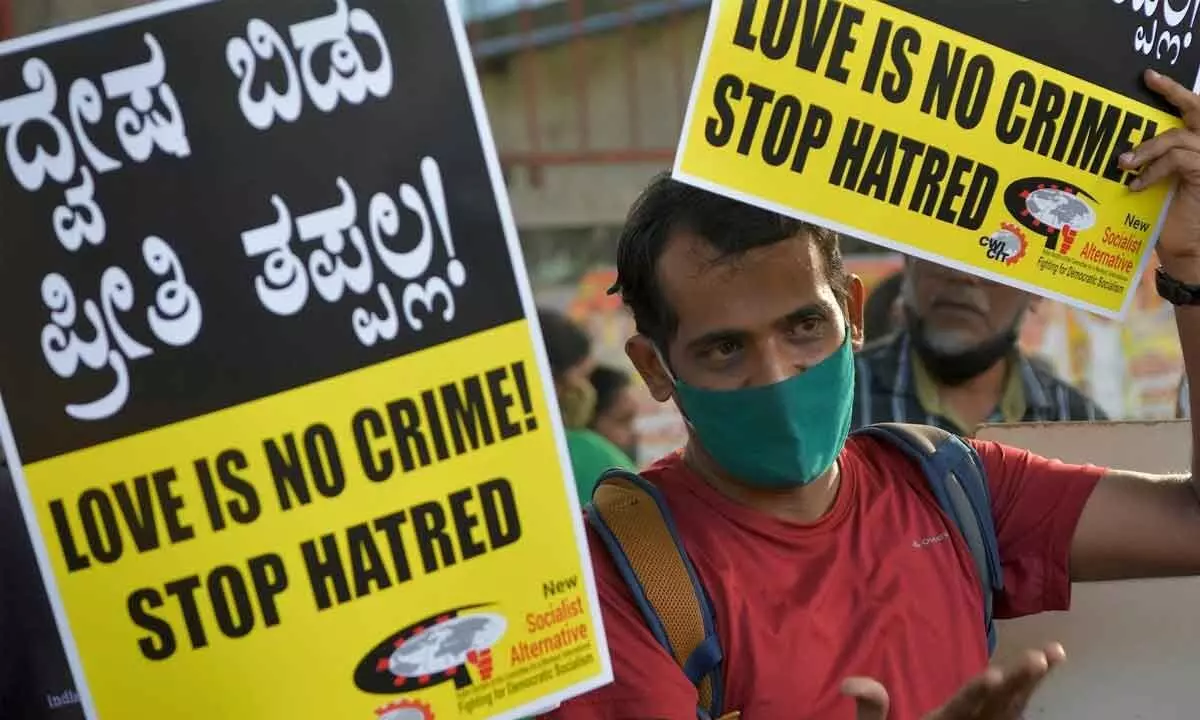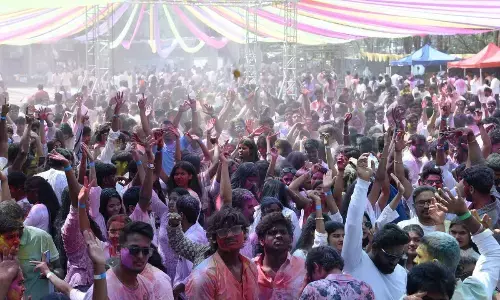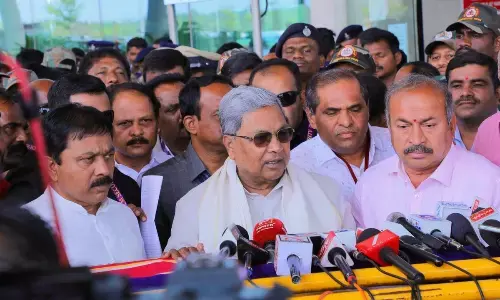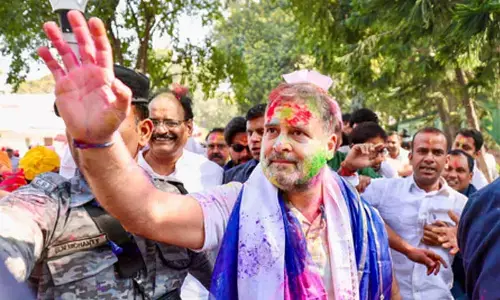Islamophobia or genuine concern?

The expression 'love jihad' is based on the assumption that there's an alleged campaign by Muslim men to target and convert Hindu women using deception, abduction, and marriage on the pretext of 'love'.
The proponents of this divisive theory also believe in the notion that Muslims are waging a bigger demographic 'war' against Hindus by multiplying their numbers in a manner that will allow them to eventually replace the majority community. Critics of 'love jihad' point out that it is a conspiracy theory founded on Islamophobia and propounded by the Hindutva right-wing across India.
The modern love jihad conspiracy in India has its roots traced back to the Partition in 1947. However, an older example goes further back to 1924, when a Muslim bureaucrat in Kanpur was accused of "abducting and seducing" a Hindu girl and forcefully converting her to his faith.
Lately, several incidents country-wide of not just social sensation but heinous crimes have been linked with love jihad. In politics, this phenomenon has been closely associated with Hindu nationalism, particularly with the more extremist form Hindutva that came to prevail after the Narendra Modi government took the reigns in 2014.
Love jihad is arguably a product of patriarchy and chauvinism resting on the assumption that the 'Hindu' women are but possessions of men, and defiling their purity amounts to territorial conquest. Hence, there is a need to control Muslims and protect Hindu women from them. The matters of will and consent do not figure in this scheme of ideas.
Allegations of 'love jihad' first attracted nationwide attention in September 2009. The term 'love jhad' is said to have originated in Kerala. As per the Kerala Catholic Bishops Council, by October 2009, nearly 4,500 girls in Kerala had been targeted. Hindu Janajagruti Samiti, a right wing Hindu organisation, claimed that 30,000 girls had been converted in Karnataka alone. These developments fanned the perceptions that the 'conspiracy' points to enforced protection of Hindu women from Muslim men who appear attractive but are actually on the prowl to meet their sinister targets.
After 2009, the phenomenon flared up again in 2010, 2011 and 2014.
On June 25, 2014, then Kerala Chief Minister Oommen Chandy brought to the attention of the state legislature that 2,667 young women converted to Islam in the state between 2006 and 2014. He stated, however, that there was no evidence for the conversions to be happening per force, and that the apprehensions of love jihad were "baseless."Islamic organisations such as the Popular Front of India and the Campus Front have been accused of inciting such developments. This conspiracy theory and the events surrounding it came to highlight most significantly in Uttar Pradesh by 2014 and even contributed to the success of BJP there.
The prevalence and alleged and established evidence of love jihad has resulted in incidents of vigilante assaults, murders and other kinds of violent episodes. In 2013, the riot in Muzaffarnagar has been described as "the worst violence in Uttar Pradesh in recent history", in the wake of which, the Army was deployed in the state for the first time in 20 years. The clashes between the Hindu and Muslim communities there in August-September of 2013, led to at least 62 deaths (42 Muslims and 20 Hindus), injured 93 and left more than 50,000 people displaced. The curfew lasted till September 17.
The concept of love jihad was institutionalised in India after BJP took over the reins of power in 2014. Legislation against this purported conspiracy was initiated in several BJP states and has been implemented in Uttar Pradesh by the Yogi Adityanath government, where it also functions as a means of repression of Muslims by the state and crackdown on interfaith marriages.
On a smaller scale, disruption of weddings and harassments on the pretext of "investigating" in case of love jihad are also prevalent malpractices garbed as checks. In May 2017, the Kerala High Court annulled a marriage of a converted Hindu woman Akhila alias Hadia to a Muslim man Shafeen Jahan on the grounds that the bride's parents were absent, nor consented for the marriage. The decision of the court was challenged by Shafeen Jahan in the Supreme Court of India, which overturned the annulment of Hadiya's marriage by the Kerala HC. In September 2020, Uttar Pradesh Chief Minister Yogi Adityanath called for a strategy to prevent "religious conversions in the name of love" and even considered passing an ordinance for the same, if needed. Some call this turn of events a result of patriarchy and attitudes towards women's choice in marriage, and allegedly using women's rights as a cover for so-called Hindu nationalism.
Shortly before the love jihad law was passed, the Allahabad High Court pronounced that the "right to live with a person of his/her choice, irrespective of their religion professed by them, is intrinsic to right to life and personal liberty." Despite the prevelance of anti-conversion laws in India since 1967, Uttarakhand and Himachal Pradesh were the first states that introduced a clause regarding marriages.
Uttarakhand's Freedom of Religion Act, 2018, prohibits conversion by misrepresentation, force, fraud, undue influence, coercion, allurement or marriage. Its punishment may vary from a jail term of 1-5 years and a fine, making it a non-bailable offence. Himachal Pradesh too passed a similar law in 2019.
The UP Vidhi Virudh Dharma Samparivartan Pratishedh Adyadesh 2020 (Prohibition of Unlawful Religious Conversion Ordinance), infamously called the 'love jihad' law, states among other things that a marriage will be declared null and void if the "sole intention" of the same is to "change a girl's religion". Certain peculiariarities and features of the love jihad law include marriage with the intent of changing a girl's religion will be declared null and void, with a punishment of up to 10 years in prison; forceful conversion will be punishable with a jail term of one to five years with Rs 15,000 penalty. If the woman is a minor or belongs to a Scheduled Caste or Scheduled Tribe, the jail term will be between 3 years and 10 years and the penalty would go up to Rs 25,000.
Further, mass conversions will be punishable with a jail term of 3-10 years and a fine of Rs 50,000 on the organisations conducting it. If someone intends to change their religion after marriage, they are required to submit an application to the District Magistrate two months in advance. Under the new law, it is incumbent on the person seeking conversion to prove that it is done voluntarily and not forcefully or fraudulently. In case of any violation under this provision, one is liable to face a jail term from six months to three years and a fine of at least Rs 10,000.
India is not the only country to host this phenomenon.
In Myanmar, there is a notion propagated by the Ashin Wirathu-led 969 Movement that alleges Islamisation of Buddhist women through deception (Muslim men pretend to be Buddhists and lure Buddhist women into Islam) and in order to counter that, justify the military oppressing the Rohingyas. Legislation is introduced to safeguard Buddhist women from love jihad. Similar incidents surfaced among the U.K's Sikh diaspora. In 2014, the Sikh Council allegedly received reports that girls from British Sikh families were falling prey to love jihad. They were reportedly exploited by their husbands, some of whom were later abandoned in Pakistan.










